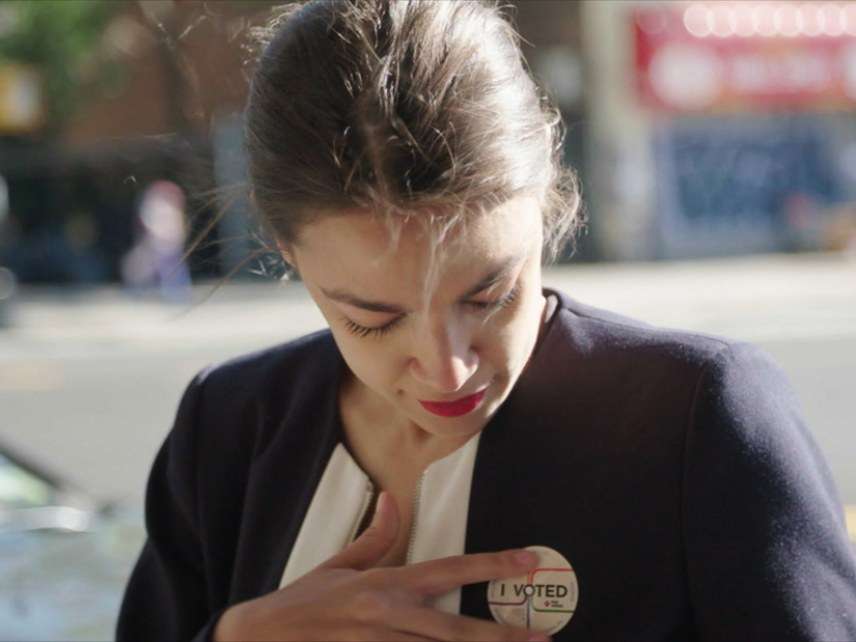Netflix Paying $10 Million for Ocasio-Cortez Campaign Documentary. Isn't the Free Market Great?
Thanks to the Citizens United decision, the streaming service can play it whenever and wherever it wants.

Deadline has broken the news that Netflix is paying $10 million for the rights to distribute Knock Down the House, a documentary that follows the campaigns of four women running against incumbents. One of the women is Rep. Alexandria Ocasio-Cortez (D–N.Y.).
The film was apparently the darling of this year's Sundance Film Festival, which wrapped up last weekend. It won the Festival Favorite Award, beating out more than 100 other candidates. Deadline says this appears to be the biggest documentary deal ever hammered out at a film festival.
There will, no doubt, be all sorts of jokes about how a documentary partly about a socialist is benefitting immensely from a massive capitalist company. But keep in mind that the deal isn't with her; it's with the filmmakers. And she's not the only person the movie's about, even if she's the only one who has become a household name.
What I do want to point out is that Deadline's coverage of this documentary about four progressive candidates does not include the phrase "Citizens United." But it's the Supreme Court's decision in Citizens United v. FEC which makes it clear that no government forces can censor Netflix from showing the documentary however and whenever it wants.
Ocasio-Cortez hates the Citizens United decision and wants a constitutional amendment overturning it. This has been a pretty steadfast position among Democrats: They believe the Citizens United decision has ushered in an era of "dark money" and of massive, manipulative mega-corporations buying elections.
All of that fundamentally ignores what the Citizens United case actually involved—an attempt, just before the 2008 Democratic Party primaries, to censor advertisements for a documentary critical of Hillary Clinton. It was a case about censoring the media.
Prior to the Citizens United ruling, it still would have been perfectly fine for Sundance to have shown Knock Down the House. The law that was being challenged banned certain types of political communications close to elections. The ruling guaranteed that Netflix can air this documentary whenever it wants, even close to Ocasio-Cortez's next election race.
And that's good! Prior to this Supreme Court decision, the law was being used to censor what the media could and could not do. That makes anger at the decision, particularly from challengers facing uphill battles, all the more confusing. Laws that limit campaign spending and the ability to get support from outside the political parties ultimately benefit entrenched incumbents, who have legislative history and lots of simple political inertia on their sides. It's the challengers who desperately need of financial support and avenues to increase the reach of their messages. It's really, really hard to beat incumbents. Challengers like the ones in Knock Down the House.
Ocasio-Cortez has benefited greatly from press coverage—both positive and negative—and that coverage most certainly played a role in her win. Tellingly, when people on the left talk about the money that comes in to help candidates in getting their message across, they bring up "big oil" and "big pharma" but tend to leave out Hollywood and the media. (Conservatives do bring it up, of course. They yell it from the rooftops.)
Should Netflix be allowed to air this documentary come 2020 when Ocasio-Cortez is looking to get re-elected? Yes, absolutely. Does the information in the documentary magically become more sinister and a threat to democracy now that $10 million is changing hands to make sure people can view it? Absolutely not. That money doesn't magically transform into votes. The candidate still needs to make her case. It's just that enough people like her message that they're willing to spend lots of money to provide the megaphone. That's known as the marketplace of ideas, and we need it for a functioning democracy.


Show Comments (133)